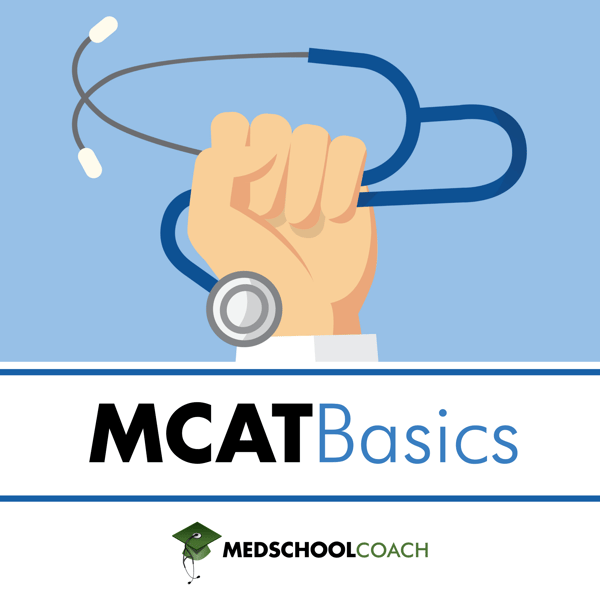Electron Transport Chain
MCAT Basics (from MedSchoolCoach)
MedSchoolCoach
4.6 • 612 Ratings
🗓️ 15 October 2024
⏱️ 37 minutes
🧾️ Download transcript
Summary
The electron transport chain is a fundamental pathway in biochemistry, critical for understanding the energy production that powers cellular function.
In this episode, guest host Alex Starks breaks down the intricate process of the electron transport chain (ETC). Building on previous discussions of glucose metabolism, Alex walks through the components that play key roles in the movement of electrons through complexes within the inner mitochondrial membrane. We also cover the functions of coenzyme Q and cytochrome c, as well as oxygen’s critical role in completing the process.
Visit medschoolcoach.com for more help with the MCAT.
Jump into the conversation:
(00:00) Intro
(02:11) Recap of glycolysis, pyruvate, and the Krebs cycle
(03:02) Location of the TCA cycle and ETC in the mitochondria
(04:22) Overview of NADH and FADH2 production
(05:38) Complex I: NADH dehydrogenase and coenzyme Q
(08:00) Complex II: Succinate dehydrogenase and FADH2
(11:15) Complex III: Cytochrome c reductase and the role of proton pumping
(14:32) Complex IV: Cytochrome c oxidase and oxygen
(18:14) The role of ATP synthase
(21:47) Total ATP yield from aerobic respiration
(26:00) How the electron chain is disrupted
(30:20) Uncouplers and their metabolic effects
(35:16) Quiz
Transcript
Click on a timestamp to play from that location
| 0:00.0 | Welcome to MCAT Basics, your ultimate guide to the essential topics you need to master for the MCAT, |
| 0:06.2 | brought to you by the physicians at med school coach. Every week, Sam Smith breaks down high-yield |
| 0:11.5 | MCAT topics, ensuring you're primed for success on test day. Join Sam as we explore the most |
| 0:17.2 | crucial subjects outlined by the AAMC pulled from official practice materials |
| 0:21.6 | and third-party resources. Get ready to elevate your MCAT game with topics tailored to |
| 0:26.3 | maximize your score potential. Today's guest host is Alex Starks. Hello, I'm your host, |
| 0:32.7 | Alex Starks, and our goal for today is to master more metabolism. Been've been following along recently with our previous discussions of metabolism, |
| 0:41.3 | you know that we've been looking at the story of glucose once it enters ourselves, |
| 0:46.3 | and we've been viewing it through this lens of ripping apart glucose, |
| 0:50.3 | robbing it of its electrons, putting them into this electron transport chain, which we're going to talk about today. |
| 0:55.4 | Not only glucose during glycolosis, but also the glycolytic end product, pyruvate. |
| 1:00.8 | And then last time we talked about acetyl-CoA in the Krebs cycle at length. |
| 1:05.2 | So, and we left out discussing how we're going to continue the story of aerobic respiration, |
| 1:10.4 | meaning when oxygen's around, and we're going to continue the story of aerobic respiration, meaning when oxygen's |
| 1:11.4 | around, and we're going to shift our focus from collecting electrons to using those electrons, |
| 1:18.5 | in particular how to make ATP. |
| 1:26.4 | Before we dive into the nitty-gritty, there are some things that we need to know. |
| 1:31.1 | So glycolysis was compartmentalized to the cytoplasm. |
| 1:34.9 | The TCA cycle was in the mitochondrial matrix. |
| 1:38.7 | And now we're zooming into the mitochondrial membrane, the inner membrane, has all those folds |
| 1:43.1 | that make the mitochondria so distinctive |
| 1:45.0 | looking. |
... |
Please login to see the full transcript.
Disclaimer: The podcast and artwork embedded on this page are from MedSchoolCoach, and are the property of its owner and not affiliated with or endorsed by Tapesearch.
Generated transcripts are the property of MedSchoolCoach and are distributed freely under the Fair Use doctrine. Transcripts generated by Tapesearch are not guaranteed to be accurate.
Copyright © Tapesearch 2025.

